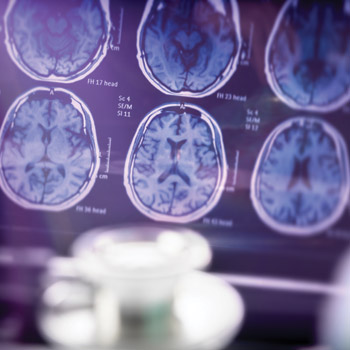New thinking about Alzheimer's diagnosis
New technology and biomarkers have contributed to the detection of Alzheimer's disease, but clinicians are skeptical about the value of a diagnosis without the ability to treat the condition.
Clinical presentation used to be the only way to diagnose Alzheimer's disease. Patients would report symptoms characteristic of dementia, including memory loss or difficulty with attention and concentration, and physicians would use the process of elimination to arrive at a presumptive diagnosis.
The advent of neuroimaging technologies that illuminate amyloid plaques in the brain has begun to change that, however, and in 2018, the National Institute on Aging and Alzheimer's Association published an updated research framework that proposed to define Alzheimer's as a biological disease determined by the presence of specific biomarkers in the brain.

“It's a big departure from the way we used to diagnose Alzheimer's based on clinical presentation and ruling out other possibilities,” said Ronald Petersen, MD, PhD, director of the Mayo Clinic's Alzheimer's Disease Research Center and Study of Aging in Rochester, Minn. “We now know that Alzheimer's is defined by the presence of amyloid plaques and neurofibrillary tangles in the brain, regardless of the clinical presentation.”
The ability to identify Alzheimer's disease and make a definitive diagnosis is advancing research efforts aimed at discovering the first effective treatments. However, many clinicians are skeptical about the value of a diagnosis in the absence of curative treatments. In addition, some are wary about incorporating testing into the care of older patients, as many who have the disease do not exhibit symptoms.
The Mayo Clinic Study of Aging, for example, found that many patients who tested positive for Alzheimer's based on biomarker evidence obtained through positron emission tomography (PET) are not symptomatic. By age 85 years, biologically defined Alzheimer's is three times more prevalent than clinically diagnosed disease, according to results published July 15 by JAMA Neurology.
Still, a biological diagnosis can play a role in clinical management of some patients by informing treatment decisions and helping with advance planning, said neurologist and dementia specialist Gregory Day, MD, assistant professor at Washington University School of Medicine in St. Louis, Mo.
“What's changed is that we now have the ability to do further testing to confirm Alzheimer's disease,” said Dr. Day. “That doesn't mean we test patients with no clinical complaints, but if there are symptoms and we rule out other causes, we now have tools to arrive at a definitive diagnosis.”
Recognizing early-stage memory loss
An investigation into possible cognitive impairment typically begins when a patient reports forgetfulness. In people older than age 65 years, the first step is determining whether the symptom is due to minor cognitive changes associated with normal aging or a sign of mild cognitive impairment (MCI), said Zaldy Tan, MD, FACP, medical director of the University of California, Los Angeles, Alzheimer's and Dementia Care Program.
According to DSM-5, MCI or mild neurocognitive disorder requires evidence of cognitive decline from a patient's previous level of functioning that is not due to other mental disorders, such as depression. It may remain static, get worse, or even improve depending on the underlying cause.
“Mild cognitive impairment means someone has a cognitive complaint that isn't normal for their age but is not severe enough to impact normal daily activities,” said neurologist Jonathan Graff-Radford, MD, co-investigator in the Mayo Clinic's Alzheimer's Research Center and Study of Aging. “It's thought that about 10% to 15% of these patients per year go on to develop dementia annually, but some eventually return to normal cognition.”
A full assessment should start with basic cognitive assessment testing, said Dr. Tan. Patients who do poorly should be closely monitored and retested at least yearly to pick up on worsening symptoms that could indicate transition to dementia. Red flags include forgetting to pay bills, missing appointments or important dates, and having trouble performing normal activities.
Internists should also look for other causes, such as effects of medications, said Thomas Grabowski, MD, professor of radiology/neurology and director of the Memory and Brain Wellness Center at the University of Washington in Seattle. Confusion and memory problems are common side effects of anticholinergic drugs, which are prescribed for conditions like chronic obstructive pulmonary disease, incontinence, and gastrointestinal disorders and have been associated with increased risk of dementia in older patients.
Other factors to consider in a differential diagnosis include evidence of brain tumor, hydrocephalus, stroke, congestive heart failure, uncontrolled diabetes, sleep apnea, and vitamin B12 deficiency, said Dr. Grabowski.
Also, be aware that cognitive impairment or dementia could be an underlying cause of sudden changes in chronic disease management, said Dr. Tan. A patient who suddenly experiences symptoms of uncontrolled diabetes or hypertension, for example, might have forgotten to take prescribed medications.
“An internist's first reaction might be to prescribe other or additional medications to regain control of the chronic disease, but that can have negative consequences,” he said.
To guard against such situations, Dr. Tan suggested asking patients open-ended questions in the exam room. For example, ask, “Can you tell me how you're taking your warfarin and what it's for?” rather than just asking patients to confirm a list of medications.
Diagnosing Alzheimer's
Although biomarker testing has the potential to rule out or definitively diagnose Alzheimer's, it is still rarely used in primary care largely due to the difficulty of obtaining tests and interpreting the results, said Dr. Day.
Approved tests are limited to amyloid PET scans, which are expensive and not yet covered by insurance, and diagnostic lumbar puncture or spinal tap, which many patients and physicians find overly invasive, he said. Once performed, the findings are difficult to interpret, especially in older patients.
“While a negative test suggesting that AD is not the cause is almost always helpful, a positive test result may not be as useful,” he said. “By age 80, close to 50% of patients would be expected to have positive AD biomarkers, but that doesn't mean that these patients all have symptoms of AD, nor does it necessarily mean that AD is the cause of a patient's cognitive impairment.”
While many physicians question the role of diagnostic testing in the absence of effective treatments, research has shown that it can impact clinical management, noted Dr. Day.
For example, findings from a large study of more than 11,000 Medicare beneficiaries with MCI or dementia suggested that physicians often change their treatment plans in response to amyloid PET scan results. The most notable change in treatment involved the use of Alzheimer's-approved drugs, which more than doubled in patients with MCI and rose significantly in those with dementia, according to the Imaging Dementia—Evidence for Amyloid Scanning Study, which was funded in part by industry and was published in the April 2 JAMA.
The study also reported that amyloid PET imaging was useful in ruling out underlying Alzheimer's disease. That is, results were negative in a significant minority of patients with a previous clinical diagnosis of Alzheimer's and, conversely, most patients with negative results had been previously diagnosed with Alzheimer's. As a result, physicians were more confident about recommending appropriate treatments and referring patients to clinical trials.
“Good studies continue to show us that patients value an accurate diagnosis so they can plan for the future and get guidance on where to turn,” said Dr. Day. “Accurate diagnoses may also help by eliminating the need for further investigation into other causes and may help families and clinicians know which treatments or medications to avoid.”
Ongoing management
Prescribing medications is one alternative when patients with MCI show signs of progression. There currently are no effective drug treatments for slowing the progression of MCI to dementia, but the FDA has approved two classes of medications that address common symptoms.
Cholinesterase inhibitors (donepezil, galantamine, and rivastigmine) prevent the breakdown of acetylcholine and are typically prescribed in the early symptomatic stages of Alzheimer's disease.* For patients with moderate to severe symptoms, physicians may consider memantine, a NMDA receptor antagonist that works by blocking the effects of glutamate, which is thought to be involved in Alzheimer's.
However, drugs should be only one part of an overall treatment plan, experts say. Internists should also pay close attention to treating other conditions that can contribute to cognitive decline.
“We know that cardiovascular risk factors are tied to progression of MCI to dementia, as well as worsening dementia,” said Dr. Tan. “One of the best things we can do as internists is to treat those risk factors through effective management of chronic diseases like hypertension and diabetes.”
Lifestyle strategies should be a primary focus of ongoing management, said Dr. Grabowski. Certain interventions have been shown to make a difference in the rate of decline and offer patients a way to take action and assert some control over their disease.
“We know that the relationship between the extent of Alzheimer's disease and the degree of symptoms people express is malleable and that it is possible to build a stronger and more resilient brain over time,” he said. “Cognitive and social engagement as well as cardiovascular fitness can make a decade of difference in where someone's tipping point will be.”
Some studies have shown that exercise can lower the risk of cognitive decline by increasing the size of the hippocampus, which is involved in memory, said Dr. Graff-Radford. For example, a review of 24 studies, published in the June 2017 The Journals of Gerontology: Series A, reported that physical activity had an overall beneficial effect on the risk of Alzheimer's disease and dementia.
It's important to counsel patients and families about what to expect as symptoms emerge or worsen and to connect them with appropriate resources, he added. The Alzheimer's Association is a key resource, offering a wealth of information online, including assistance with locating local programs and support groups. Dr. Petersen added that AARP's Global Council on Brain Health has published several useful reports on ways to maintain excellent cognitive health.
Early counseling also allows families to plan for the future while the patient is still mentally competent and able to participate in discussions, noted Dr. Grabowski.
Diagnoses of dementia or Alzheimer's disease are understandably distressing to patients and families, and it's easy to fall into despair or depression, said Dr. Graff-Radford. To help with coping, he advises clinicians to talk to patients and families about areas of the brain that are not affected by the disease and encourage patients to continue engaging in their preferred activities as long as they are able.
“Patients still have their procedural memories intact and often can continue to do creative activities that they love, such as playing music or painting,” he said. “One of my patients who has been living with Alzheimer's for 15 years has significant impairment in terms of memory and problem solving but still plays in her church band. People enjoy hearing her play, and it makes her life so much more meaningful.”



